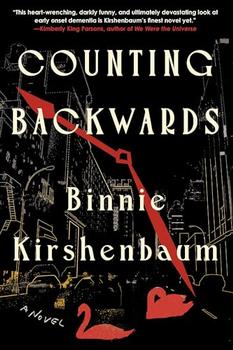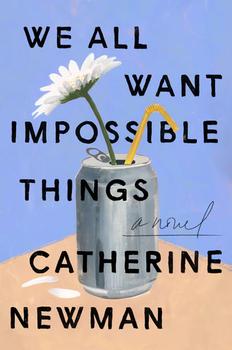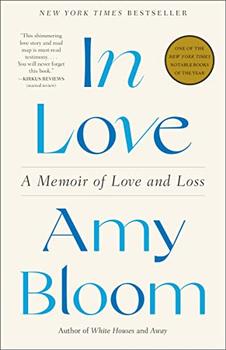Summary | Excerpt | Reviews | Beyond the book | Read-Alikes | Genres & Themes | Author Bio

Counting Backwards should be a sad story of neurological decline, but instead, author Binnie Kirshenbaum uses wit to further the conversation around illness and marriage. Addie is a collage artist married to Leo, a physician who has hallucinations. He sees Ghandi, for instance, stirring lentils. And a man walking on stilts. Aware he is seeing what cannot be there, Leo self-diagnoses and thinks he is suffering from Charles Bonnet Syndrome, in which visual hallucinations result from the brain's reaction to low vision. Leo's vision has always been crappy. Perhaps his brain is punishing his eyes. However, a trip to an ophthalmologist confirms this isn't the root of his hallucinations.
And so, the mystery begins. What is wrong with Leo?
Kirshenbaum brings a riveting story to life with a nightmare scenario. The beginning of the book reveals that Leo is now in hospice and Addie is his caregiver. A few pages later, the before-hospice story begins with Leo's hallucinations. Kirshenbaum's manipulation of time works as context. Her storytelling chops are evident. She has the unique ability to pair sarcasm and an occasional one-liner to deliver a marriage narrative that feels contemporary and very real. This makes Counting Backwards a truly special novel and Kirshenbaum its star.
The story is told from Addie's point of view. Frantic and needing to solve the riddle of Leo's
hallucinations, she finds comfort in her friends. Shelia owns the art gallery where Addie's
collages are displayed and sold; she continually pushes Addie to meet her deadlines. Addie's
best friend is Zachary; she calls him Z. Z believes his children are Einstein-level brilliant and
Addie has to bite her sarcastic tongue. Judy moved out of the city and has an opinion
on what is wrong with Leo. She thinks he has probably ingested a boatload of toxins.
Shelia, Z, and Judy represent a diverse group and are a comic diversion from the story's weight: beautiful Leo is unwell and nothing makes sense.
Leo's CAT scan is normal. He is then scheduled for an MRI and Addie wonders, "Why don't they call an MRI a DOG? Keep to the theme. CAT. PET. DOG." This amuses Leo, but because we didn't know Leo before he started hallucinating, it is hard to pinpoint if his amusement at Addie is, well, because she's Addie, or if it's his condition. While Addie is fretting, Leo is aware something is terribly wrong. Alzheimer's is a nascent fear, and he is desperate to rule it out. He wants Addie to take all his identification and put him on the R train, with the idea being that if he returns, he doesn't have Alzheimer's. Addie refuses. One of the most painful passages is when Leo insists Addie isn't his wife. He says, "You are not my wife. You look like my wife, but you are not my wife," and as if to confirm this for a fact, he says, "My wife is prettier than you."
In another passage, he goes to the house where he grew up. When the homeowner answers the door, Leo tells him, "You're not my father," before being escorted away by the local police.
Addie is in full-blown grief for what she is losing day after day. She is taking Xanax. She phones
a suicide hotline, not because she wants to kill herself, but because she needs to vent her frustration about the medical system, which can't seem to diagnose what is wrong with Leo. Addie has changed over months, no longer terrified when Leo puts on his thick winter coat in the middle of summer and leaves the house at 3 a.m. Now she hopes he runs into danger and succumbs to it because she is exhausted and at her wits' end. It makes her fantasize the worst. "You want the crazed meth head to shoot him; you want him to be the victim, DOA, of a hit-and-run; you want him to drown and accidental death in the Hudson River."
Marcy, a mental health consultant, is pretty sure Leo has Lewy Body disease (which the comic
Robin Williams also had and may have led to his death by suicide) and the knowing gives Addie a calmness. Perhaps predictably, when others who care about Leo suddenly discover he has been keeping a secret for two years, his deteriorating brain in the grips of this terrible disease, they are stunned and incredulous because, to their way of thinking, Leo is the smartest man they know. As if dementia-related illnesses hopscotch over intellectually gifted brains. Desperate to find a placement for Leo because she can no longer manage the stubbornness, delusions, and apathy that are part of Lewy dementia, Addie calls care homes in Boston, New
Jersey, and New York. The farther away the better; it speaks to her exhaustion and acceptance of the new normal. She cannot fix this. It will not magically disintegrate. After twenty-four years of a smart, engaging, funny, scientific husband, Leo is a new invention. She doesn't recognize him, and worse, she cannot help him.
I have long resented how dementia is referred to as the long goodbye: it is not goodbye. It is
treading water. It is surviving daily grief and violence and cruelty. It is years and years of
dissonance, and months of forgetfulness. It is the injustice of stolen goods. A thief rooting
around someone's brain and then, poof, the mind is gone but the body is still plodding along
haphazardly.
The poet Rumi once wrote, "You are not a drop in the ocean, you are the ocean in a drop." But
tell that to a caregiver whose lover has a deteriorating brain and doesn't recognize his life and
has delusions. Even for an artist like Addie, who carefully selects the pieces to use in her
collages, her humor, creativity, and wit cannot save Leo or their marriage. And therein is the
point of Counting Backwards, which is a contemporary document of the mentally unwell, a beautiful, terrible story of erasure. I shouldn't find it so remarkable given my personal
history of loving someone with dementia, but I do.
It's the wit. It's the fact that the author doesn't overwrite her characters. It's the valorization of
friends and how necessary they are in our lives. It's how the characters are amorphous cultural
figures with a lot of money. White people, yes, but this disease can and does happen to everyone; skin color is irrelevant.
Counting Backwards doesn't pretend to know everything about dementia and the passages about the worst of the illness aren't heartbreaking nor are they emotionally raw. What it succeeds in showcasing is a committed marriage and the veneers that marriage shows the public.
Kirshenbaum knows how to engage an audience with subject matter many of us are sadly familiar with, and yet we are not left nostalgic or feeling as if we have just read something tragic we have already experienced in real life. The characters oxygenate a personal story of sickness and survivorship, and they are the novel's pulse and grace. That is what makes Counting Backwards seem so heartfelt.
![]() This review
first ran in the April 9, 2025
issue of BookBrowse Recommends.
This review
first ran in the April 9, 2025
issue of BookBrowse Recommends.

If you liked Counting Backwards, try these:

by Catherine Newman
Published 2023
For lovers of Meg Wolitzer, Maria Semple, and Jenny Offill comes this raucous, poignant celebration of life, love, and friendship at its imperfect and radiant best.

by Amy Bloom
Published 2023
Winner of the 2022 BookBrowse Nonfiction Award
This powerful memoir by New York Times bestselling author Amy Bloom is an illuminating story of two people whose love and shared life experiences led them to find a courageous way to part - and of a woman's struggle to go forward in the face of loss.
He who opens a door, closes a prison
Click Here to find out who said this, as well as discovering other famous literary quotes!
Your guide toexceptional books
BookBrowse seeks out and recommends the best in contemporary fiction and nonfiction—books that not only engage and entertain but also deepen our understanding of ourselves and the world around us.